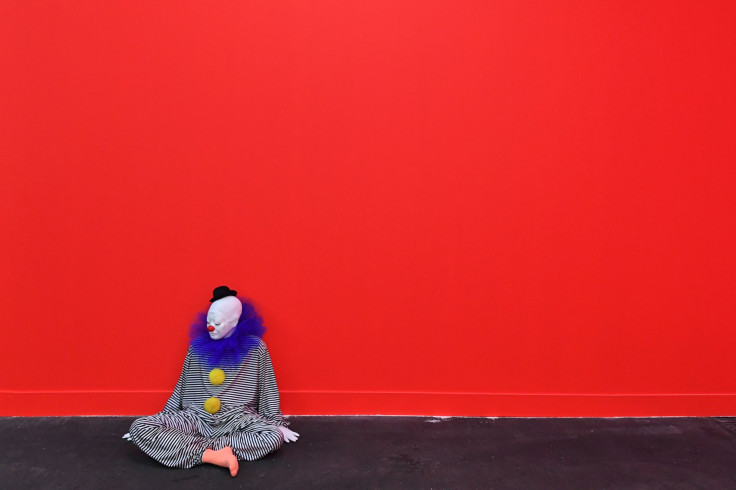Scary Clowns Are Not Real: Why Creepy Trend Isn't Funny To Professionals

In late September, an 11-year-old girl in Athens, Georgia, was arrested after a bringing a knife into her middle school. She claimed the weapon was protection against clowns, which she had heard were threatening to attack kids at schools across the country.
"Creepy clown" hysteria is sweeping the country in response to an inexplicable surge in incidents of people dressing up as clowns and posing as clowns on social media to threaten or scare others. More than a dozen arrests have been made in connection with cases in more than a dozen states.
However, the real victims of the threats are not innocent bystanders — few, if any, of the sightings or threats have resulted in physical harm — but actual professional clowns. The long-running tradition of clowning in America stands to lose a whole generation of "would-be-bozos" if this recent rash of incidents cements the image of clowns as a symbol of fear.
"I've watched the numbers dwindle," Minnesota clown Tricia Manuel told International Business Times in a phone interview Wednesday. "When I first started, no one was afraid of clowns."
Fear of clowns is at least one of the major causes of the decline in the number of working and amateur clowns in the country. In 2014, the World Clown Association, the nation’s largest clown trade group, told Time Magazine that membership had declined from roughly 3,500 to 2,500 since 2004 — a loss of over 28 percent. That trend has not changed.
Manuel performs under the name Pricilla Mooseburger. She owns and operates a clown-themed costume and makeup shop, as well as an educational clown camp, in Maple Lake, Minnesota. She says clowns have been fighting the public relations battle against depictions of themselves as scary or evil for a long time.
"Ninety percent of the time someone is afraid of clowns, it is going to be because of the movie 'It,'" Manuel said, referencing the 1986 Stephen King novel-turned-television movie about a nightmarish clown who haunts children — "It" is getting a remake that will be released in 2017.
Hey, guys, time to cool the clown hysteria--most of em are good, cheer up the kiddies, make people laugh.
— Stephen King (@StephenKing) October 3, 2016
Manuel writes articles for the clown community on her website in which she urges her compatriots not to dress up on Halloween and to be careful during the Halloween season in general. She refuses customers in her store hoping to get done up in "scary clown" makeup for fear of perpetuating the dangerous stereotype. One of her clown friends has received more than dozen threatening phone calls since the current hysteria began, some from hundreds of miles away.
"It's heartbreaking," Manuel said. "We are very concerned. Most people get into clowning because they love to make people laugh. They love kids. This is ruining it. It is going to change what we are able to do."
That the recent wave of incidents has, in multiple cases, shut down schools in response to threats of violence on social media is especially concerning. Manuel says it is vital that kids have a positive experience with clowns in order to produce adults willing to carry the art form's torch. While parents might be able to shield kids from movies like "It," a school closure is harder to explain.
And the image of a clown is one particularly susceptible to corruption. Researchers have found that the ambiguous features and exaggerated facial expressions of a clown can lead to a disconnect between the intent of the performer and the spectator, allowing pranksters room to pervert the clown's message as one of fear and internet trolls to saturate social media with disturbing depictions of clowns.
"The facial disguise temporarily eliminates from social intercourse that part of the body which the individual's personal feelings and attitudes are revealed or can be deliberately communicated to others," Paul Salkovskis of the Maudsley Hospital Centre for Anxiety Disorders and Trauma in London told Psychology Today in 2012.
But clowning is also an industry and the economic ripple effects of clown hysteria are tangible. When the current wave of clown-themed incidents began with reports in South Carolina that people dressed as clowns were trying to lure kids into the woods, a local TV station interviewed a pair of real clowns who had become afraid to work. Manuel recognized the clowns' costumes as ones she had made in her store.
"I don't expect to be getting business from them anytime soon," she said.
One thing Manuel and many other clowns advocate as a way to combat the "scary clown" public relations damage is to be more careful about the verbiage in social media and media reports. The suspects involved in these threats and sightings are posing as clowns, they claim, and should never be described as actual clowns themselves.
“Anybody doing that is not a clown,” Randy Christensen, president of the World Clown Association said in a recent video to members addressing the recent reports. “If somebody dressed up as a police officer to gain someone’s trust, but the person wasn’t really a police officer and then tried to kidnap a child, they wouldn’t say, ‘Oh, a police officer kidnapped a child.’ They’d say, ‘Somebody impersonating a police officer.’ And I think that’s a differentiation we need to know.”
Manuel has another suggestion: "Prosecute these people to nth degree and put that on the front page so people see that this is not some fun thing to do."
© Copyright IBTimes 2025. All rights reserved.






















